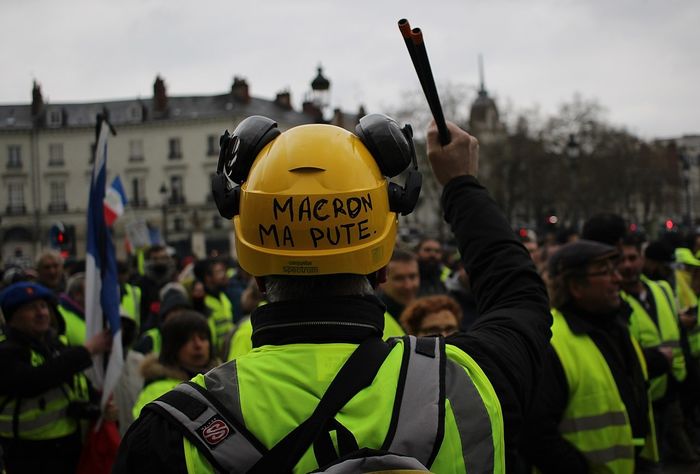‘A crisis of democracy’: MEP Manon Aubry on police violence in France
Eric Williams discusses the police repression of France’s pension protests with Manon Aubry, Co-Chair of the Left group in the European Parliament, and La France Insoumise MEP

Manon Aubry’s career has seen her work on human rights at Oxfam and Sciences Po, offering expertise on cases from the Democratic Republic of the Congo and across Francophone Africa. But now, as Co-Chair of the Left group in the European Parliament, she is focused on violations in France.
Before winning the Presidency in 2017, Emmanuel Macron and his La République En Marche! party promised a liberal ‘revolution’. But though he invoked the rhetoric of major historic moments of social upheaval — think 1789 or 1848 — Macron’s revolution was to be one of economic ‘modernisation’. His vision involved dismantling France’s employment protections and waking her up to the supposed ‘economic reality’ of the 21st century.
However, six years on, it is images of protests against his government that are drawing comparisons to emotive paintings of crowds storming the Bastille, as flare-wielding demonstrators stormed the Paris offices of BlackRock, the world’s largest asset manager, on Thursday. According to Aubry, Macron’s government is attempting to enforce an unpopular economic project despite opposition from the “largest social movement of her lifetime”, and is increasingly relying on police violence to do so.
On the morning we spoke, French people mobilised for a historic 11th day of national strikes, ahead of next week’s Constitutional Council decision on whether to block President Macron’s pension reforms. Aubry has long objected to the targeting of social protections — her political awakening came during student protests against attempts to flexibilize young employee contracts during Jacques Chirac’s Presidency. But for Aubry, state repression against pension protests has transitioned France from a country in “social crisis to a country in a crisis of democracy”.
The Fifth Republic’s constitution has a strong executive. Article 49.3 allows laws to be passed without a parliamentary vote. In the past, its use has been limited to around once a year. However, Macron’s economic ‘modernisation’ project has particularly relied upon such extraordinary measures to bypass opposition to his market reforms. Last month’s triggering of Article 49.3 to raise the legal age of retirement from 62 to 64 was the eleventh time Prime Minister Élisabeth Borne has done so, in only ten months in power.
This type of “deeply undemocratic” governance, Aubry says, “is an exception amongst European democracies”. Meanwhile, she argues, the scale of popular mobilisation, with between 570,000 to 2 million people out again on Thursday, shows how isolated the President has become: “Macron has made himself a prisoner within the walls of the Élysée Palace”.
“Macron has made himself a prisoner within the walls of the Élysée Palace”
Rather than reassessing its economic and social programme, Manon Aubry depicts a government buckling down, “relying instead on state repression and police violence to subdue popular protest”.
The French police and gendarmerie’s arsenal is one of Europe’s most extensive, and is the only police force to use explosive ammunition. Their model of crowd control involves confrontation, not de-escalation, as UK citizens saw when Liverpool fans were tear gassed at last year’s Champions League final in Paris. Heavily-criticised BRAV-M motorbike brigades, “war material” grade weaponry like GM2L tear gas grenades, sting ball grenades, water cannons — have all been deployed against demonstrators at the pension protests.
Aubry points to multiple condemnations from the international community of violations of freedom of expression and assembly in France. Citing criticisms of “excessive use of force” from human rights groups including the Council of Europe, Amnesty International, and Reporters Without Borders, Aubry illustrates how the state has dealt with demonstrators and journalists. To finish her case, she cites the United Nations Special Rapporteur, who noted a “disproportionate” response by the state against activists in Saint-Soline, where illegal tear gas grenade use left one protester in a coma.
Meanwhile, the European Union has been slower to enter into French affairs. Last week, Aubry and MEPs from La France Insoumise, the Socialist Party, and the Greens tabled a motion in the European Parliament for a debate over whether to condemn the police’s actions. However, the motion was blocked by European Parliament groups including Macron and his party’s ‘Renew’ group, on the grounds of the matter being a purely “French issue”. As Co-Chair of the Left Group in the European Parliament, Aubry declares: “Europe spends much time lecturing on the rule of law, human rights, and democracy, and has articles outlining these principles in the EU Charter of Fundamental Rights. It cannot be right for the EU to be silent on what has been going on in France”.
Since his time as Economy Minister under Hollande, Macron has played the ‘moderniser’ — the wise technocrat bringing harsh but economically necessary neoliberal reforms. But as demonstrators and unions have pointed out, he is governing in a time characterised by inequality and rising cost of living, when market reforms are not as tenable as they may have been before the 2008 financial crisis and COVID-19.
According to Aubry, the strength of the social movement has demonstrated a “popular will for an alternative vision for society”. And if Macron is willing to abandon basic freedoms to impose his policies, Aubry argues international observers should see such practices for what they are — those of an antidemocratic and repressive government ruling by “force and violence”.
 News / Hundreds of Cambridge academics demand vote on fate of vet course20 February 2026
News / Hundreds of Cambridge academics demand vote on fate of vet course20 February 2026 News / University Council rescinds University Centre membership20 February 2026
News / University Council rescinds University Centre membership20 February 2026 News / Judge Business School advisor resigns over Epstein and Andrew links18 February 2026
News / Judge Business School advisor resigns over Epstein and Andrew links18 February 2026 News / Petition demands University reverse decision on vegan menu20 February 2026
News / Petition demands University reverse decision on vegan menu20 February 2026 News / Caius students fail to pass Pride flag proposal20 February 2026
News / Caius students fail to pass Pride flag proposal20 February 2026











